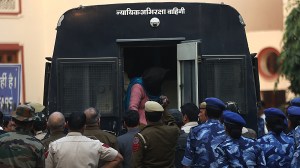IB doesnt trust us,Delhi keeps opposing us,complained US
WikiLeaked cables from Mulford,Bolton show US felt India acted against spirit of bilateral ties.
US diplomats fretted about the Indian position on a variety of issues,which they felt ran contrary to the spirit of the bilateral partnership,the latest tranche of diplomatic cables released by WikiLeaks suggests.
In a series of communications between 2006 and 2008,embassy officials in Delhi complained about things like Indias insistence on scanning US diplomatic pouches,visa delays for officers and denial of permission to sell US embassy property in the capital.
The cables also point to increasing American frustration over Indias campaign for a permanent seat at the United Nations Security Council,and the independent positions that New Delhi took at various multinational forums,which US diplomats said were out of tune with increasingly strong bilateral ties.
In a January 2008 cable that describes a meeting between Ambassador David Mulford and the then Indian foreign secretary Shivshanker Menon,the US embassy complains that a range of bilateral problems has started to make people question the strategic partnership that both sides seek.
The ambassador listed the Indian insistence to x-ray the diplomatic pouch,visa delays for US officers,holding US sales of property in India hostage to resolution of the tax issue in New York,the delay in the expansion of the Fulbright program,and persistent lack of cooperation on agricultural issues as among the irritants that seem inconsistent with the emerging strategic partnership that both countries advertise, the cable says.
The cable suggests that India deliberately kept some issues unresolved,such as the sale of US mission land in Delhi unless Washington moved on resolving tax issues that were pending for the Indian consulate in New York.
While Menon tried to pacify Mulford,saying that several issues had been persisting for years and were not an indication of bilateral ties,he also made the point that the issues existed because the interaction with the US generates negative reinforcement.
The US was especially miffed with Agriculture Minister Sharad Pawar who had then made a public statement that problems in South Asia have their roots in Washington.
The Americans also worried that many annoyances like delays in visa for officers stemmed from increased pressure from the Intelligence Bureau,which they suspected harboured resentment towards the US.
Mulford complained that the Indian bureaucracy was stalling things due to the lack of sustained political support from Indian governments for relations with the US.
…At least half of our problems stem from the fact that the Intelligence Bureau simply does not trust us and harbors resentment at what it perceives as continuing USG (US government) efforts to penetrate the Indian services, Mulford noted,adding that several bureaucrats did not respond for fear of being branded pro-US.
In another cable from January 2006,the then US ambassador the UN,John R Bolton,complained that India was not siding with the US on a range of issues within the UN and at other forums. Indias positions on key issues of importance to the US in New York do not appear to have kept pace with the increasingly strong bilateral ties developing in New Delhi and Washington, the cable says.
The US carried out a statistical analysis of Indias voting record at the UN General Assembly,and concluded that India had voted in correlation with the US at less than 20 per cent of occasions. On Middle East issues,Indias voting correlation with the US was 5.90%; on disarmament and arms control issues,39.30%; and on human rights issues,11.80%, the cable says.



- 01
- 02
- 03
- 04
- 05




























